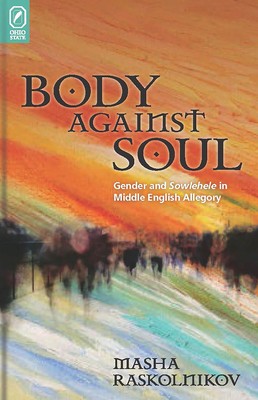
- We will send in 10–14 business days.
- Author: Masha Raskolnikov
- Publisher: Ohio State University Press
- ISBN-10: 0814256791
- ISBN-13: 9780814256794
- Format: 15.2 x 22.9 x 1.4 cm, softcover
- Language: English
- SAVE -10% with code: EXTRA
Reviews
Description
In medieval allegory, Body and Soul were often pitted against one another in debate. In Body Against Soul: Gender and Sowlehele in Middle English Allegory, Masha Raskolnikov argues that such debates function as a mode of thinking about psychology, gender, and power in the Middle Ages. Neither theological nor medical in nature, works of sowlehele ("soul-heal") described the self to itself in everyday language--moderns might call this kind of writing "self-help." Bringing together contemporary feminist and queer theory along with medieval psychological thought, Body Against Soul examines Piers Plowman, the "Katherine Group," and the history of psychological allegory and debate. In so doing, it rewrites the history of the Body to include its recently neglected fellow, the Soul.
The topic of this book is one that runs through all of Western history and remains of primary interest to modern theorists--how "my" body relates to "me." In the allegorical tradition traced by this study, a male person could imagine himself as a being populated by female personifications, because Latin and Romance languages tended to gender abstract nouns as female. However, since Middle English had ceased to inflect abstract nouns as male or female, writers were free to gender abstractions like "Will" or "Reason" any way they liked. This permitted some psychological allegories to avoid the representational tension caused by placing a female soul inside a male body, instead creating surprisingly queer same-sex inner worlds. The didactic intent driving sowlehele is, it turns out, complicated by the erotics of the struggle to establish a hierarchy of the self's inner powers.EXTRA 10 % discount with code: EXTRA
The promotion ends in 16d.22:09:34
The discount code is valid when purchasing from 10 €. Discounts do not stack.
- Author: Masha Raskolnikov
- Publisher: Ohio State University Press
- ISBN-10: 0814256791
- ISBN-13: 9780814256794
- Format: 15.2 x 22.9 x 1.4 cm, softcover
- Language: English English
In medieval allegory, Body and Soul were often pitted against one another in debate. In Body Against Soul: Gender and Sowlehele in Middle English Allegory, Masha Raskolnikov argues that such debates function as a mode of thinking about psychology, gender, and power in the Middle Ages. Neither theological nor medical in nature, works of sowlehele ("soul-heal") described the self to itself in everyday language--moderns might call this kind of writing "self-help." Bringing together contemporary feminist and queer theory along with medieval psychological thought, Body Against Soul examines Piers Plowman, the "Katherine Group," and the history of psychological allegory and debate. In so doing, it rewrites the history of the Body to include its recently neglected fellow, the Soul.
The topic of this book is one that runs through all of Western history and remains of primary interest to modern theorists--how "my" body relates to "me." In the allegorical tradition traced by this study, a male person could imagine himself as a being populated by female personifications, because Latin and Romance languages tended to gender abstract nouns as female. However, since Middle English had ceased to inflect abstract nouns as male or female, writers were free to gender abstractions like "Will" or "Reason" any way they liked. This permitted some psychological allegories to avoid the representational tension caused by placing a female soul inside a male body, instead creating surprisingly queer same-sex inner worlds. The didactic intent driving sowlehele is, it turns out, complicated by the erotics of the struggle to establish a hierarchy of the self's inner powers.

Reviews